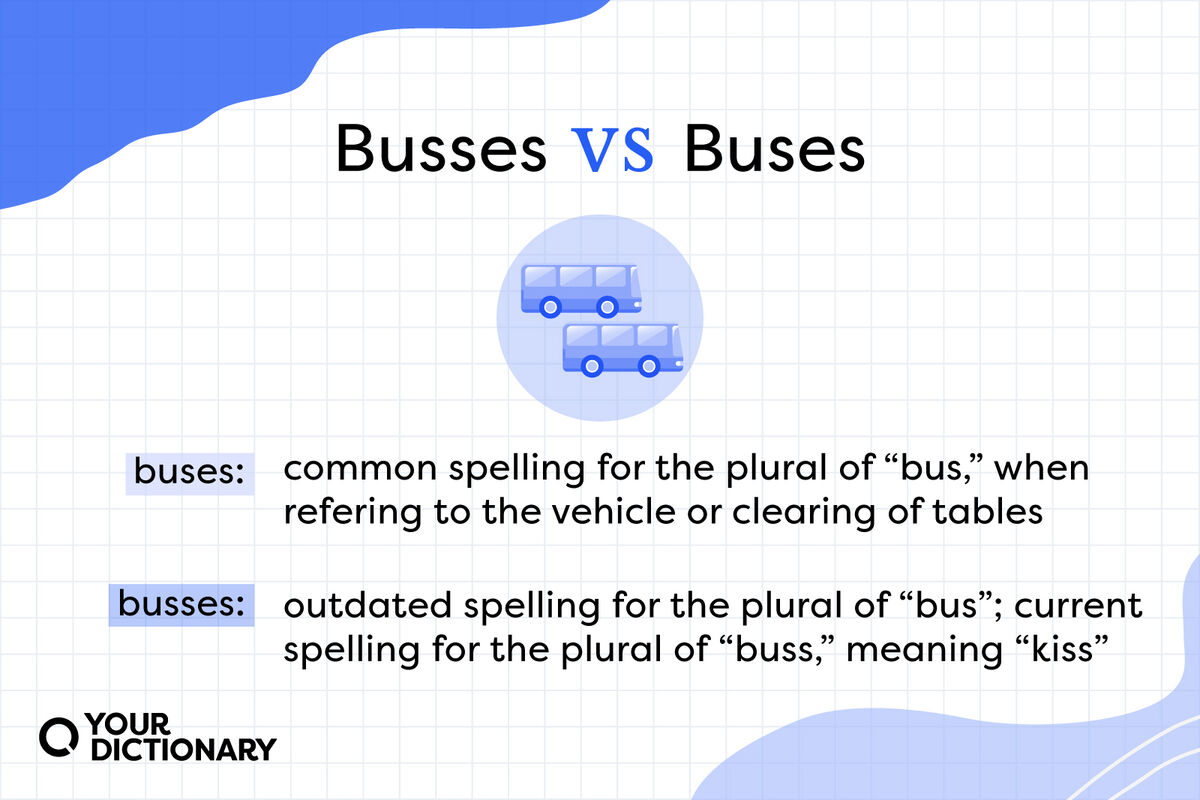
When you’re stuck behind a fleet of buses, already late for work, you can take a deep breath and remember that the plural of buses is more rife with history and information than you could have ever thought possible. Is it buses or busses? The first one is the most common today, but technically, it can be either!
General Rules About Plural Forms of Nouns Ending in “S”
When a noun ends in “S,” making it plural usually involves simply adding an -es to the end of that word. That works with words like:
- class -> classes
- walrus -> walruses
- virus -> viruses
- truss -> trusses
- bus -> buses
Pretty easy, right? Well, part of the confusion with buses is that it looks like it should rhyme with nouns like fuses (fyoo-zez), abuses (abyoo-zes), and ruses (roo-zes). Instead, it rhymes more with trusses (truh-sez), fusses (fuh-sez), and cusses (cuh-sez), all of which contain that double “S.”
Is “Buses” or “Busses” the Plural of “Bus”
Before we get too deep into the bus weeds, buses is the more common form of the word in literature and in online searches.
Busses isn’t technically wrong when you’re talking about the plural form of bus, but it’s become exceedingly rare in the modern day. You’re more likely to confuse a reader if you use busses.
What Does “Buses” Mean?
Bus usually acts as a noun that refers to "a large vehicle that transports several passengers from place to place." When you’re talking about more than one of these vehicles, you would spell it buses.
- I had to ride a few buses to get here, but it was worth it.
- The buses were running late all day because of construction going on downtown.
Bus also acts as a verb to describe "the act of traveling by bus" or "to generally get transported by vehicle." Buses refers to when this happens in the present tense.
- I’m so glad that the community buses our kids to and from school every day.
- Our dad buses us to soccer practice after school.
In North America, bus also acts as a verb to describe "removing dirty dishes or clearing the table," usually at a restaurant or public eatery. The present tense of this is also buses.
- He buses tables all day, so it makes sense that he’s tired by the time he gets home.
- Whenever we go out to eat, she buses her own table, so it’s become a habit for me, too.
Is “Busses” Ever Correct When Describing Vehicles or Clearing Tables?
For further confusion, busses technically is correct when you’re referring to the long vehicle. In fact, buss was one of the forms of bus in the 1800s, and many dictionaries still list busses as an appropriate secondary form of buses.
When referring to different forms for the verb "meaning clearing tables," both bussed and bussing are appropriate.
“Busses” Is a Real Word That Deals With Kissing
If you’re still with us here, buss is an actual word, beyond just an old-timey spelling for bus. Buss is a noun that means "a kiss, a smooch, or a peck on the lips." Busses is the plural form.
- Going to Grandma’s house meant preparing myself for an excess of bear hugs, busses, and cheek pinches.
- While movies had prepared me for regular hugs and busses in a relationship, nothing prepared me for the spontaneous dances and inside jokes.
Buss is also a verb that means “to kiss.” Thus, busses is the present tense form of the verb.
- She busses me every morning when I wake up.
- He busses his partner every time he comes home with croissants.
If you haven’t used or experienced this word a lot, it’s totally fine. It’s archaic, and it can easily get confusing in speech, considering it has the exact same pronunciation as buses. Kiss is more common, harder to confuse, and has the same number of syllables and letters as buss, anyway.